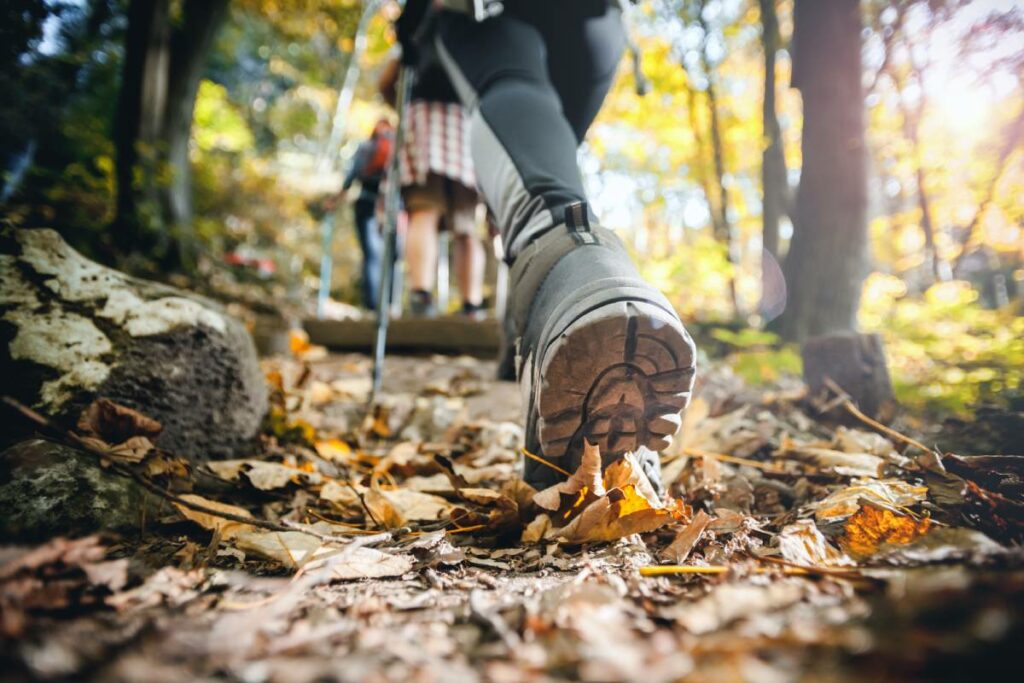Are you looking for an exciting and rewarding outdoor activity? Experts say hiking is the perfect choice for you and we’ve got great tips for new hikers! Hiking can be a great way to spend time outdoors, get exercise, and explore nature. Whether it’s your first time on the trail or you are a seasoned hiker, these tips will help you have an enjoyable experience. Here are eight tips for new hikers to ensure your journey is safe and fun!

Tip 1: Plan Ahead
One of the most important things to remember when planning a hike is to plan. Research the trail you will be taking, research potential hazards, and always let someone know where you are going and when you plan on returning.
Planning also includes packing the right items for your journey. Bring plenty of water, snacks, a first aid kit, and any necessary safety gear like headlamps or flares.
Tip 2: Dress Appropriately
The proper attire can make or break your experience on the trail. Wear comfortable clothing appropriate for the weather, and ensure you have a pair of good hiking boots or shoes. Avoid wearing cotton clothing as it will not keep you warm when wet. Also, don’t forget to bring extra layers like a windbreaker or fleece if the weather changes unexpectedly.
If you want extra protection from the elements, consider wearing hiking pants with built-in UV protection.
Tip 3: Know Your Limits
Recognizing your capabilities before you set out on a hike is essential. Make sure that the trail’s difficulty level is appropriate for your skill level and fitness level. Don’t push yourself too far, which could result in injury or death.
Some ways to understand your limits include practicing hikes, having a buddy to hike with, and listening to your body. If you feel fatigued, take breaks or turn back instead of pushing yourself too hard.
Tip 4: Stay On The Trail
Staying on the designated trail is essential for two reasons. First, it helps prevent injury from natural hazards like fallen trees or slippery rocks. Second, it helps preserve the environment around you by preventing erosion and other disturbances.
Some trails may have multiple paths, but try to stay on the main track as much as possible. If you come across a fork in the road or an unmarked trail, take extra precautions and double-check your map before proceeding.
Tip 5: Stay Alert
Hiking can be a great way to relax and enjoy nature, but it is essential to remain alert. Stay aware of your surroundings and look for hazards like loose rocks, deep water crossings, or wildlife.
One way to stay alert is to bring an animal companion like a dog or horse. They can act as an early warning system and help you navigate the trail safely.
Tip 6: Respect Wildlife
Remember to respect wildlife while you are on the trail. Even if wild animal appears harmless, they may still be dangerous and should not be approached or disturbed.
Make sure to keep your distance, and never feed a wild animal. If you encounter an animal carcass, do not touch it, as it could spread disease or attract predators.
Tip 7: Stay Hydrated
Hydration is essential for hikers, especially hiking in hot weather or high altitudes. Bring plenty of water and stay hydrated throughout your journey.
If you are not sure if it is safe to drink from a natural water source (such as a stream or river), bring a water filter so that you can purify the water yourself.
Tip 8: Leave No Trace
When hiking, it is essential to leave no trace behind. This means packing out any trash you bring, being aware of your impact on the environment, and not disturbing plants or animals along the way.
Some ways to ensure you leave no trace include packing out any biodegradable waste, not building new structures or modifying the land, and respecting other hikers by being considerate of their space.
Final Tips for New Hikers: The Benefits Of Hiking
As we’ve discussed in our tips for new hikers, hiking can bring numerous benefits in both physical and mental health. Physically, it can help strengthen the heart, build muscle, and improve coordination. Hiking is also an excellent source of cardiovascular exercise that can help reduce stress levels and improve overall well-being. Studies have also shown that hiking in nature can result in improved concentration levels, improved sleep, and even an enhanced sense of happiness.
Hiking is a great way to enjoy nature and get some exercise, but it’s important to remember the tips we discussed in this article. Following these guidelines ensures your hike is safe and enjoyable for everyone involved—including yourself! Ensure you bring plenty of water, a camera, dress appropriately, know your limits, stay on the trail, remain alert while hiking, respect wildlife, stay hydrated throughout your journey, and always leave no trace behind. With proper preparation and knowledge of safety protocols from our tips for new hikers, everyone can explore trails confidently.



